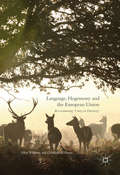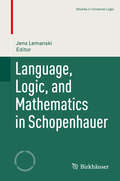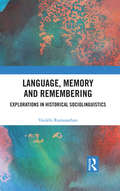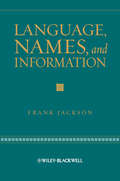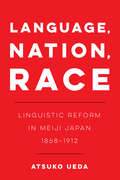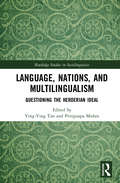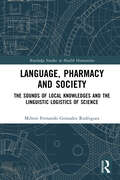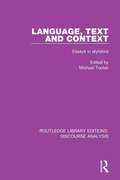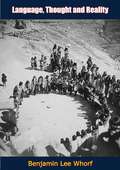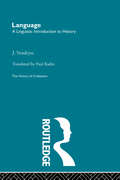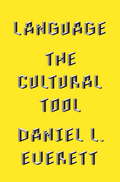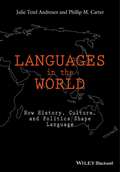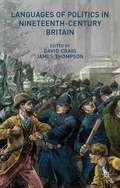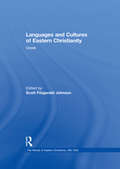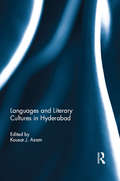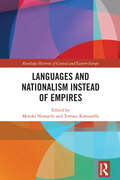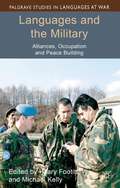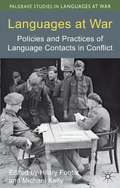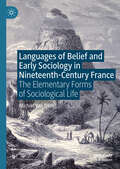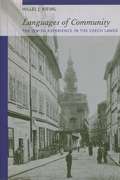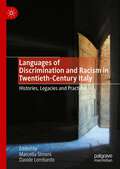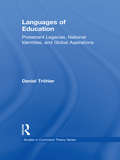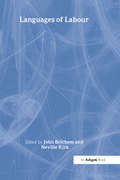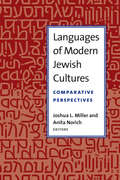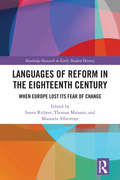- Table View
- List View
Language, Hegemony and the European Union
by Glyn Williams Gruffudd WilliamsThis book critically examines the European Union's "Unity in Diversity" mantra with regard to language. It uses a theoretical framework based on hegemony both as a system and as a relationship. Operating within sociolinguistics, the book replaces the notion of ideology in poststructuralist thought with that of hegemony. The authors argue that forging unity across language communities contradicts the tenets of classical liberal theory. Global neo-liberalism influences this orthodoxy, shifting the parameters of power and political control. Over nine chapters, the authors cover topics such as globalization and social change, justice, governance and education. The book will be of interest to sociolinguists, political scientists, sociologists, as well as scholars of language and globalization and European studies.
Language, Logic, and Mathematics in Schopenhauer (Studies in Universal Logic)
by Jens LemanskiThe chapters in this timely volume aim to answer the growing interest in Arthur Schopenhauer’s logic, mathematics, and philosophy of language by comprehensively exploring his work on mathematical evidence, logic diagrams, and problems of semantics. Thus, this work addresses the lack of research on these subjects in the context of Schopenhauer’s oeuvre by exposing their links to modern research areas, such as the “proof without words” movement, analytic philosophy and diagrammatic reasoning, demonstrating its continued relevance to current discourse on logic. Beginning with Schopenhauer’s philosophy of language, the chapters examine the individual aspects of his semantics, semiotics, translation theory, language criticism, and communication theory. Additionally, Schopenhauer’s anticipation of modern contextualism is analyzed. The second section then addresses his logic, examining proof theory, metalogic, system of natural deduction, conversion theory, logical geometry, and the history of logic. Special focus is given to the role of the Euler diagrams used frequently in his lectures and their significance to broader context of his logic. In the final section, chapters discuss Schopenhauer’s philosophy of mathematics while synthesizing all topics from the previous sections, emphasizing the relationship between intuition and concept. Aimed at a variety of academics, including researchers of Schopenhauer, philosophers, historians, logicians, mathematicians, and linguists, this title serves as a unique and vital resource for those interested in expanding their knowledge of Schopenhauer’s work as it relates to modern mathematical and logical study.
Language, Memory and Remembering: Explorations in Historical Sociolinguistics
by Vaidehi RamanathanThis volume explores issues of memory, remembering and language in late colonial India. It is the first systematic historical sociolinguistic study of English private and public citizens who lived in and/or worked for India and the Indian cause from the 1920s to the 1940s. While some of the English have lived as common citizens and were committed to India, their voices and contributions have remained on the margins of Indian collective memory. This book offers microhistorical readings of extended language forms generally underexplored in sociolinguistics (such as letters, telegrams, missives, and oral histories) to reorient facets of individual memories, lives, and endeavours against larger officialised understandings of the past. Using previously unpublished corpus of archival material and interviews with English private citizens from that period, this volume on historical sociolinguistics will be of interest to scholars and researchers of language and linguistics, South Asian studies, post-colonial literary studies, culture studies, and modern history.
Language, Names, and Information (The Blackwell / Brown Lectures in Philosophy #8)
by Frank JacksonLanguage, Names, and Information is an important contribution to philosophy of language by one of its foremost scholars, challenging the pervasive view that the description theory of proper names is dead in the water, and defending a version of the description theory from a perspective on language that sees words as a wonderful source of information about the nature of the world we live in. Challenges current pervasive view that the description theory of reference for proper names has been refuted Discusses several topics at the center of current debates, including representation and information, two-dimensionalism, possible worlds, and broad vs. narrow content Maintains the conversational and somewhat informal tone of the original lectures upon which the book is based
Language, Nation, Race: Linguistic Reform in Meiji Japan (1868-1912) (New Interventions in Japanese Studies #1)
by Atsuko UedaA free open access ebook is available upon publication. Learn more at www.luminosoa.org.Language, Nation, Race explores the various language reforms at the onset of Japanese modernity, a time when a "national language" (kokugo) was produced to standardize Japanese. Faced with the threat of Western colonialism, Meiji intellectuals proposed various reforms to standardize the Japanese language in order to quickly educate the illiterate masses. This book liberates these language reforms from the predetermined category of the "nation," for such a notion had yet to exist as a clear telos to which the reforms aspired. Atsuko Ueda draws on, while critically intervening in, the vast scholarship of language reform that engaged with numerous works of postcolonial and cultural studies. She examines the first two decades of the Meiji period, with specific focus on the issue of race, contending that no analysis of imperialism or nationalism is possible without it.
Language, Nations, and Multilingualism: Questioning the Herderian Ideal (Routledge Studies in Sociolinguistics)
by Pritipuspa Mishra Ying-Ying TanLanguage, Nations, and Multilingualism explores the legacy of Herder’s ideas about the relationship between language and nationalism in the post-colonial world. Focusing on how anti-colonial and post-colonial nations reconcile their myriad multilingualisms with the Herderian model of one language-one nation, it shows how Herder’s model is both attractive and problematic for such nations. Why then does the Herderian model have such valency? How has the Herderian ideal of one nation-one language continued to survive beneath the uncomfortable resolution struck by new multilingual nations as they create fictions of a singular national mother tongue? To what extent is Herder still relevant in our contemporary world? How have different nations negotiated the Herderian ideal in different ways? What does the way in which multilingual post-colonial nations deal with this crisis tell us about a possible alternative framework for understanding the relationship between language and nation? By approaching this investigation from diverse archives across Asia, Africa, Europe, Latin America, and the Caribbean, Language, Nations, and Multilingualism proposes answers to the aforementioned questions from a global perspective that takes into account the specificities of a range of colonial experiences and political regimes. And by extending the discussion backwards in time to offer a more historical reading of the making of modern nations, it allows us to see how multilingualism has always disrupted constructions of monoglot nations.
Language, Pharmacy and Society: The Sounds of Local Knowledges and the Linguistic Logistics of Science (Routledge Studies in Health Humanities)
by Milton Fernando RodriguezThis book explores the vital role language plays in shaping how we understand and discuss medicines, making for a more detailed study of pharmaceutical and pharmacological language to more clearly understand the intersection of language, health, and culture.Gonzalez Rodriguez charts the development of the language of pharmacy from the mid-19th century onward, drawing on data from Icelandic and Spanish natural language corpora, historical sources, and contemporary data. The book brings together scholarship from sociolinguistics, media, and cultural studies, and the history of science to highlight the possibilities afforded by an interdisciplinary approach to pharmacy-related language.The book will benefit readers by providing a deeper understanding of the intersection between language, science, and culture, making it especially valuable for students and scholars in sociolinguistics, history of science, medical humanities, and cultural studies.
Language, Text and Context: Essays in stylistics (RLE: Discourse Analysis)
by Michael ToolanFirst published in 1992, this wide-ranging collection of essays focuses on the principle of contextualisation as it applies to the interpretation, description, theorising and reading of literary and non-literary texts. The collection aims to reveal the interdependencies between theory, analysis, text and context by challenging the myth that stylistics entails a fundamental separation of text from context, linguistic description from descriptive interpretation, or language from situation. The essays cover a historically diverse set of texts, from Puttenham to Colemanballs, and a number of language-sensitive topics such as post-modernism, irony, newspaper representations, gender and narrative.
Language, Thought and Reality: Selected Writings (The\mit Press Ser.)
by Benjamin Lee WhorfWritings by the pioneering linguist Benjamin Whorf, including his famous work on the Hopi language as well as general reflections on language and meaning. The pioneering linguist Benjamin Whorf (1897–1941) grasped the relationship between human language and human thinking: how language can shape our innermost thoughts. His basic thesis is that our perception of the world and our ways of thinking about it are deeply influenced by the structure of the languages we speak. The writings collected in this volume include important papers on the Maya, Hopi, and Shawnee languages as well as more general reflections on language and meaning.—Print ed.
Language: Indiana University Publications In Anthropology And Linguistics (University Of California Publications In American Archaeology And Ethnology #Vol. 27)
by J. VendryesOriginally published between 1920-70,The History of Civilization was a landmark in early twentieth century publishing. It was published at a formative time within the social sciences, and during a period of decisive historical discovery. The aim of the general editor, C.K. Ogden, was to summarize the most up to date findings and theories of historians, anthropologists, archaeologists and sociologists. This reprinted material is available as a set or in the following groupings: * Prehistory and Historical Ethnography Set of 12: 0-415-15611-4: £800.00 * Greek Civilization Set of 7: 0-415-15612-2: £450.00 * Roman Civilization Set of 6: 0-415-15613-0: £400.00 * Eastern Civilizations Set of 10: 0-415-15614-9: £650.00 * Judaeo-Christian Civilization Set of 4: 0-415-15615-7: £250.00 * European Civilization Set of 11: 0-415-15616-5: £700.00
Language: The Cultural Tool
by Daniel L. EverettA bold and provocative study that presents language not as an innate component of the brain--as most linguists do--but as an essential tool unique to each culture worldwide. For years, the prevailing opinion among academics has been that language is embedded in our genes, existing as an innate and instinctual part of us. But linguist Daniel Everett argues that, like other tools, language was invented by humans and can be reinvented or lost. He shows how the evolution of different language forms--that is, different grammar--reflects how language is influenced by human societies and experiences, and how it expresses their great variety. For example, the Amazonian Pirahã put words together in ways that violate our long-held under-standing of how language works, and Pirahã grammar expresses complex ideas very differently than English grammar does. Drawing on the Wari' language of Brazil, Everett explains that speakers of all languages, in constructing their stories, omit things that all members of the culture understand. In addition, Everett discusses how some cultures can get by without words for numbers or counting, without verbs for "to say" or "to give," illustrating how the very nature of what's important in a language is culturally determined. Combining anthropology, primatology, computer science, philosophy, linguistics, psychology, and his own pioneering--and adventurous--research with the Amazonian Pirahã, and using insights from many different languages and cultures, Everett gives us an unprecedented elucidation of this society-defined nature of language. In doing so, he also gives us a new understanding of how we think and who we are.
Languages In The World: How History, Culture, And Politics Shape Language (First Edition)
by Julie Tetel Andresen Phillip M. CarterThis innovative introduction outlines the structure and distribution of the world's languages, charting their evolution over the past 200,000 years. Balances linguistic analysis with socio-historical and political context, offering a cohesive picture of the relationship between language and society Provides an interdisciplinary introduction to the study of language by drawing not only on the diverse fields of linguistics (structural, linguist anthropology, historical, sociolinguistics), but also on history, biology, genetics, sociology, and more Includes nine detailed language profiles on Kurdish, Arabic, Tibetan, Hawaiian, Vietnamese, Tamil, !X#65533;#65533; (Taa), Mongolian, and Quich#65533; A companion website offers a host of supplementary materials including, sound files, further exercises, and detailed introductory information for students new to linguistics
Languages Of Politics In Nineteenth-century Britain
by David Craig James ThompsonA comprehensible and accessible portrait of the various 'languages' which shaped public life in nineteenth century Britain, covering key themes such as governance, statesmanship, patriotism, economics, religion, democracy, women's suffrage, Ireland and India.
Languages and Cultures of Eastern Christianity: Greek (The Worlds of Eastern Christianity, 300-1500)
by Scott Fitzgerald JohnsonThis volume brings together a set of fundamental contributions, many translated into English for this publication, along with an important introduction. Together these explore the role of Greek among Christian communities in the late antique and Byzantine East (late Roman Oriens), specifically in the areas outside of the immediate sway of Constantinople and imperial Asia Minor. The local identities based around indigenous eastern Christian languages (Syriac, Coptic, Armenian, Georgian, etc.) and post-Chalcedonian doctrinal confessions (Miaphysite, Church of the East, Melkite, Maronite) were solidifying precisely as the Byzantine polity in the East was extinguished by the Arab conquests of the seventh century. In this multilayered cultural environment, Greek was a common social touchstone for all of these Christian communities, not only because of the shared Greek heritage of the early Church, but also because of the continued value of Greek theological, hagiographical, and liturgical writings. However, these interactions were dynamic and living, so that the Greek of the medieval Near East was itself transformed by such engagement with eastern Christian literature, appropriating new ideas and new texts into the Byzantine repertoire in the process.
Languages and Literary Cultures in Hyderabad
by Kousar J. AzamThere is great interest in recent scholarship in the study of metropolitan cultures in India as evident from the number of books that have appeared on cities such as Delhi, Mumbai, Chennai and Kolkata. Though Hyderabad has a rich archive of history scattered in many languages, very few attempts have been made to bring this scholarship together. The papers in this volume bring together this scholarship at one place. They trace the contribution of different languages and literary cultures to the multicultural mosaic that is the city of Hyderabad How it has acquired this uniqueness and how it has been sustained is the subject matter of literary cultures in Hyderabad. This work attempts to trace some aspects of the history of major languages practiced in the city. It also reviews the contribution of the various linguistic groups that have added to the development not just of varied literary cultures, but also to the evolution of an inclusive Hyderabadi culture. The present volume, it is hoped, will enthuse both younger and senior scholars and students to take a fresh look at the study of languages and literary cultures as they have evolved in India's cities and add to the growing scholarship of metropolitan cultures in India.
Languages and Nationalism Instead of Empires (Routledge Histories of Central and Eastern Europe)
by Tomasz Kamusella Motoki NomachiThis volume probes into the mechanisms of how languages are created, legitimized, maintained, or destroyed in the service of the extant nation-states across Central Europe. Through chapters from contributors in North America, Europe, and Asia, the book offers an interdisciplinary introduction to the rise of the ethnolinguistic nation-state during the past century as the sole legitimate model of statehood in today’s Central Europe. The collection’s focus is on the last three decades, namely the postcommunist period, taking into consideration the effects of the recent rise of cyberspace and the resulting radical forms of populism across contemporary Central Europe. It analyses languages and their uses not as given by history, nature, or deity, but as constructs produced, changed, maintained, and abandoned by humans and their groups. In this way, the volume contributes saliently to the store of knowledge on the latest social (sociolinguistic) and political history of the region’s languages, including their functioning in respective national polities and on the internet. Languages and Nationalism Instead of Empires is a compelling resource for historians, linguists, and political scientists who work on Central and Eastern Europe.
Languages and the Military
by Michael Kelly Hilary FootittThrough detailed case studies ranging from the 18th century until today,this book explores the role of foreign languages in military alliances, in occupation and in peace building. It brings together academic researchers and practitioners from the museum and interpreting worlds and the military.
Languages at War
by Michael Kelly Hilary FootittThrough detailed case studies ranging from the 18th century until today,this book explores the role of foreign languages in military alliances, in occupation and in peace building. It brings together academic researchers and practitioners from the museum and interpreting worlds and the military.
Languages of Belief and Early Sociology in Nineteenth-Century France: The Elementary Forms of Sociological Life
by Michiel Van DamThis book presents a new reading of the history of French social science and religion through an investigation of early sociology’s techniques for narrating the category of belief. The author argues that by looking at the history of social sciences in this manner, we gain a deeper understanding of both our present debates on post-secularity as well as our modernist past, both of which were thoroughly shaped by their reflections and critiques on the notion of belief yet failed to enter into any sort of meaningful communication with each other. This book seeks to rectify this failure by introducing the concept of ‘belief-languages’, an anthropological framework designed to historicize different discussions on belief and allow for their comparative description and analysis.
Languages of Community: The Jewish Experience in the Czech Lands
by Hillel J. KievalIn the Czech lands, Kieval writes, Jews have felt the need constantly to define and articulate the nature of group identity, cultural loyalty, memory, and social cohesiveness, and the period of "modernizing" absolutism, which began in 1780, brought changes of enormous significance.
Languages of Discrimination and Racism in Twentieth-Century Italy: Histories, Legacies and Practices
by Davide Lombardo Marcella SimoniThis volume represents one of the first extensive studies that investigates the persistence of questions of race and racism in Italy from the liberal age to the present, through colonialism, Fascism and post-war Italy. It adopts an interdisciplinary perspective to investigate the intertwining of the cultural, social, legislative and political dynamics of discrimination in Italy’s past and present. Drawing upon the expertise of historians, political scientists, sociologists, scholars of literature and experts in cultural studies, the original essays collected in this volume show a remarkable continuity and the persistence of racism in the Italian cultural and political discourse, in society and in the representation of Others. They also speak of the shifting of practices of Othering from one group to another in different historical contexts.
Languages of Education: Protestant Legacies, National Identities, and Global Aspirations (Studies in Curriculum Theory Series)
by Daniel TröhlerIn this landmark contribution to the study of the formation of the modern school, Daniel Tröhler applies one of the most recognized methods of historical research to an analysis of the "language" of the academic discipline of education. Arguing the value of looking at languages rather than arguments--langues rather than paroles--this method of historical research is used to examine the background of different philosophies, theories, or arguments of education, specifically republicanism and Protestantism. Tröhler’s argument is that such analysis is essential to tracing back educational arguments to the ideological core of their concerns, and thus to understanding in international perspective the historical development of education systems and organizations and to evaluating their different theoretical and political approaches and claims. Elegantly written, with the historian’s attention to archival material, this book enables the reader to understand the complex and different social, cultural, religious, and political context factors embedded in the "thought" of schooling and its objects of scrutiny--its notions of the child and teacher. Languages of Education is essential reading for scholars and students across the fields of history and philosophy of education, curriculum studies, and comparative education.
Languages of Labour
by Neville Kirk John BelchemThis volume offers a multidisciplinary approach to the study of language in relation to the subject of history. The British and American contributors put forward the idea that language is a broadly based means of communication with contested and consensual meanings, and that such meanings must be revealed and evaluated by precise historical contextualisation of language and proper attention to established rules of historical method. The essays contend that the connections between the linguistic and the social must be rethought. The book aims to move beyond the unproductive fragmentation and relativism, the narrow textual range and the literal and anti-realist readings of the postmodern ’linguistic turn’ to offer a rigorous approach to the study of language and the subject of history.
Languages of Modern Jewish Cultures: Comparative Perspectives
by Anita Norich Joshua L MillerThis collection of essays brings to Jewish Language Studies the conceptual frameworks that have become increasingly important to Jewish Studies more generally: transnationalism, multiculturalism, globalization, hybrid cultures, multilingualism, and interlingual contexts. Languages of Modern Jewish Cultures collects work from prominent scholars in the field, bringing world literary and linguistic perspectives to generate distinctively new historical, cultural, theoretical, and scientific approaches to this topic of ongoing interest. Chapters of this edited volume consider from multiple angles the cultural politics of myths, fantasies, and anxieties of linguistic multiplicity in the history, cultures, folkways, and politics of global Jewry. Methodological range is as important to this project as linguistic range. Thus, in addition to approaches that highlight influence, borrowings, or acculturation, the volume represents those that highlight syncretism, the material conditions of Jewish life, and comparatist perspectives.
Languages of Reform in the Eighteenth Century: When Europe Lost Its Fear of Change (Routledge Research In Early Modern History Ser.)
by Susan Richter; Thomas Maissen; Manuela AlbertoneSocieties perceive "Reform" or "Reforms" as substantial changes and significant breaks which must be well-justified. The Enlightenment brought forth the idea that the future was uncertain and could be shaped by human beings. This gave the concept of reform a new character and new fields of application. Those who sought support for their plans and actions needed to reflect, develop new arguments, and offer new reasons to address an anonymous public. This book aims to compile these changes under the heuristic term of "languages of reform." It analyzes the structures of communication regarding reforms in the 18th century through a wide variety of topics.
